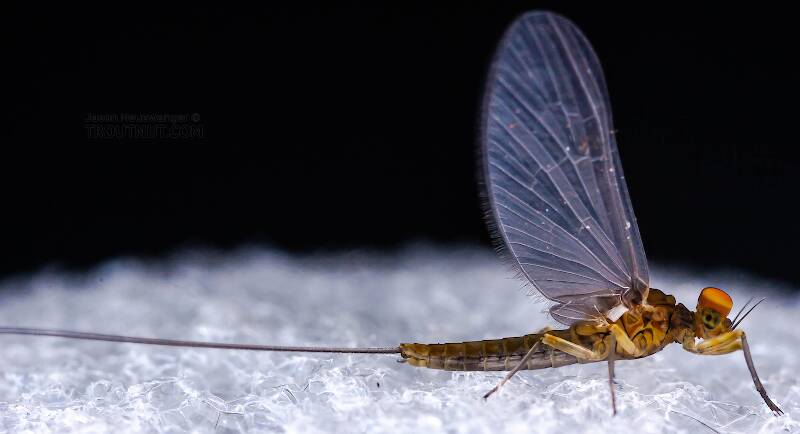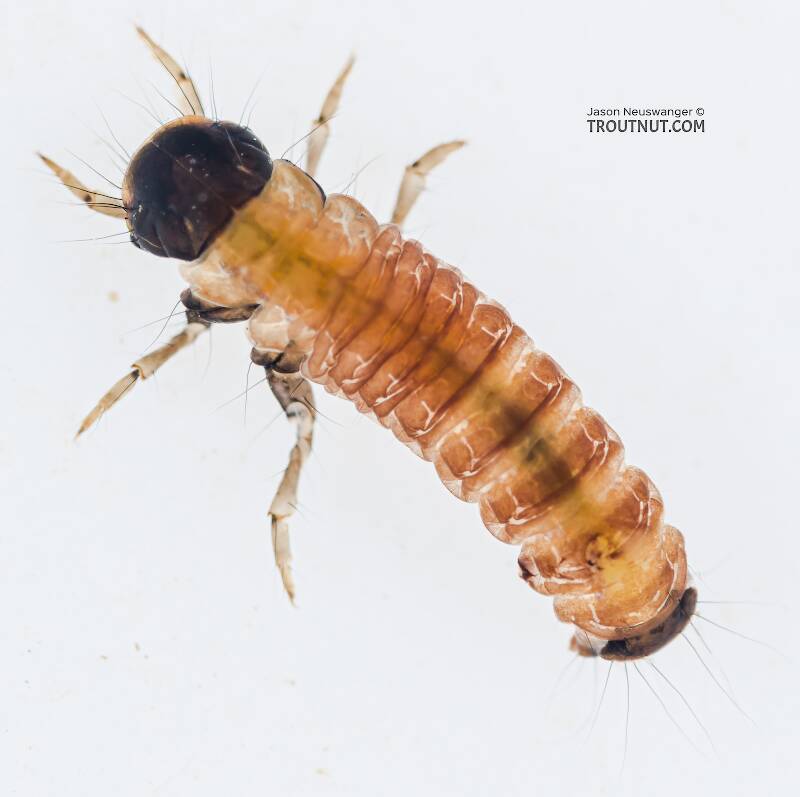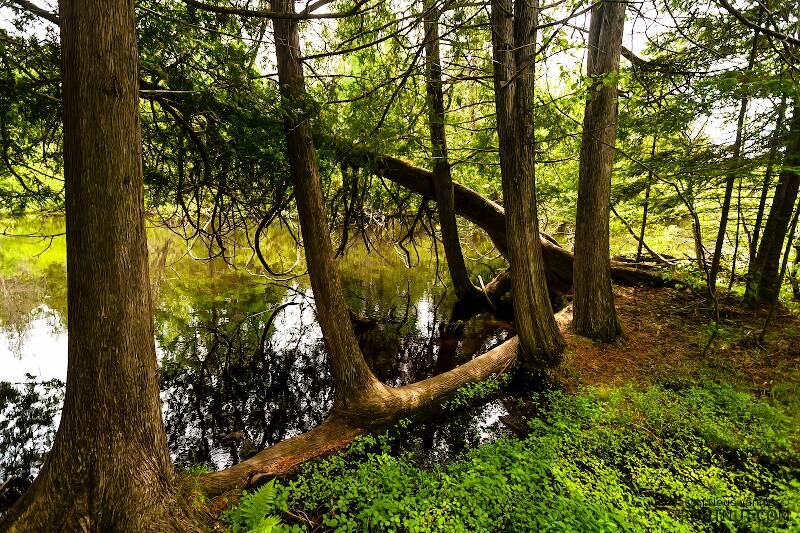
Blue-winged Olives
Baetis
Tiny Baetis mayflies are perhaps the most commonly encountered and imitated by anglers on all American trout streams due to their great abundance, widespread distribution, and trout-friendly emergence habits.
Featured on the forum

I caught this tiny larva without a case, but it seems to key pretty clearly to to Glossosomatidae. From there, the lack of sclerites on the mesonotum points to either Glossosoma or Anagapetus. Although it's difficult to see in a 2D image from the microscope, it's pretty clear in the live 3D view that the pronotum is only excised about 1/3 of its length to accommodate the forecoxa, not 2/3, which points to Glossosoma at Couplet 5 of the Key to Genera of Glossosomatidae Larvae.

Troutnut is a project started in 2003 by salmonid ecologist Jason "Troutnut" Neuswanger to help anglers and
fly tyers unabashedly embrace the entomological side of the sport. Learn more about Troutnut or
support the project for an enhanced experience here.
Pappy on May 29, 2008May 29th, 2008, 11:24 am EDT
Hey Folks,
I need some expertise in the river I mentioned in my first post.
Here is some background:
River is supposed to be stocked by the DNR yearly. The river is 20 to 30 feet across, with big trees on the banks with most of the river being in shade. The river is not clear, it is murky with a sand/mud bottom with a few rock beds mixed in here and there. I been there a few times (mornings and evenings) and have not seen any hatches of insects. There is also not alot of room for back casting. The branches of the trees hang almost into the water, but there are few obstructions in the river itself.
Questions:
Since I have seen no hatches, are dry flies going to work?
Please give recommendations on what would work in murky water.
Would a shorter rod be in order? As of now, I have a 7 weight 9' Okuma graphite rod. If this is not applicable, what size rod and fly line would work the best for this river? Currently I have 2 reels, Pflueger Medalist 1492 and a Heddon 320, fitting the fly line accordingly.
Any help and constructive criticism would be greatly appreciated.
Pappy
PS: I chucked and ducked for about 2 hours and came up with a few small browns. I was also talking to local TU members and they have heard of 20"+ browns being pulled out of this river.
I need some expertise in the river I mentioned in my first post.
Here is some background:
River is supposed to be stocked by the DNR yearly. The river is 20 to 30 feet across, with big trees on the banks with most of the river being in shade. The river is not clear, it is murky with a sand/mud bottom with a few rock beds mixed in here and there. I been there a few times (mornings and evenings) and have not seen any hatches of insects. There is also not alot of room for back casting. The branches of the trees hang almost into the water, but there are few obstructions in the river itself.
Questions:
Since I have seen no hatches, are dry flies going to work?
Please give recommendations on what would work in murky water.
Would a shorter rod be in order? As of now, I have a 7 weight 9' Okuma graphite rod. If this is not applicable, what size rod and fly line would work the best for this river? Currently I have 2 reels, Pflueger Medalist 1492 and a Heddon 320, fitting the fly line accordingly.
Any help and constructive criticism would be greatly appreciated.
Pappy
PS: I chucked and ducked for about 2 hours and came up with a few small browns. I was also talking to local TU members and they have heard of 20"+ browns being pulled out of this river.
Flybyknight on May 29, 2008May 29th, 2008, 12:06 pm EDT
Hello Pappy,
My last name is Papp, so I feel a strong desire to be of assistance.
7 weight is way over kill. 4 weight comes to mind.
For small murky water, a 7&1/2' rod, with a 5' leader would work,
and that is easy to roll cast. For a lure, I do not think that you can go wrong with a black woolly bugger with a gold bead, fished on the bottom.
IMHO
Dick
My last name is Papp, so I feel a strong desire to be of assistance.
7 weight is way over kill. 4 weight comes to mind.
For small murky water, a 7&1/2' rod, with a 5' leader would work,
and that is easy to roll cast. For a lure, I do not think that you can go wrong with a black woolly bugger with a gold bead, fished on the bottom.
IMHO
Dick
Lightly on the dimpling eddy fling;
the hypocritic fly's unruffled wing.
Thomas Scott
the hypocritic fly's unruffled wing.
Thomas Scott
Softhackle on May 29, 2008May 29th, 2008, 2:25 pm EDT
Hi Papp,
First, use the longest rod you dare. An 8 foot to 8.5 foot rod is not really long for a river 20 to 30 foot wide. The longer rod means less line on the water, and that gives you more line control. The 7 weight, as Dick has said is too heavy. A 4wt to 5 wt will be better. No matter what size rod you choose, when fishing dry flies one should have a leader at least as long as the rod. There are exceptions, but for general fishing, I go with the above.
Caution and a careful approach considering the best places to put your flies on or in the water is as important as the equipment. Study each situation carefully and work the spot from a point that gives you the best control of the line while not alerting the fish.
Keep us posted,
Mark
First, use the longest rod you dare. An 8 foot to 8.5 foot rod is not really long for a river 20 to 30 foot wide. The longer rod means less line on the water, and that gives you more line control. The 7 weight, as Dick has said is too heavy. A 4wt to 5 wt will be better. No matter what size rod you choose, when fishing dry flies one should have a leader at least as long as the rod. There are exceptions, but for general fishing, I go with the above.
Caution and a careful approach considering the best places to put your flies on or in the water is as important as the equipment. Study each situation carefully and work the spot from a point that gives you the best control of the line while not alerting the fish.
Keep us posted,
Mark
"I have the highest respect for the skilled wet-fly fisherman, as he has mastered an art of very great difficulty." Edward R. Hewitt
Flymphs, Soft-hackles and Spiders: http://www.troutnut.com/libstudio/FS&S/index.html
Flymphs, Soft-hackles and Spiders: http://www.troutnut.com/libstudio/FS&S/index.html
Vermonter
Posts: 15
Posts: 15
Vermonter on May 30, 2008May 30th, 2008, 1:28 am EDT
I would call the DNR and ask to speak to a fish tech or manager who knows the river. You can get great information on your river or any others in the area. Also check with any local fly shops and clubs in your area. Next check out some books or articals on the river or rivers in the area. When you are on the river look under bridges and in the woods to see what flies and bugs are stuck in treess and spider webs. If the river has a sandy and muddy bottom find out if it has a brown drake or hex hatch, the brown drakes hatch around 9:00 PM and the hex at 10:00 PMish. If you fish early morning you can use thoes flies also and have some luck. During the day a black or brown leach pattern might work, I have had good luck in the summer on a river which sound simalar. Also if the fish are stocked you might need to explore the river b/c the fish might not be in great numbers where you have access- but 2 miles downstream can be great sometimes. Look for cool or deep water as the summer goes on, big browns will move to thoes spots. Good Luck!
Trtklr on Jun 4, 2008June 4th, 2008, 10:50 am EDT
dry flies work year round. I know I'll take some heat for that but this last november late I put the my theory to test and sure enough rainbow on a dry in november with an air temp of 40. I live in michigan and my question to is why are you fishing a murky stream with a soft bottom? sounds scary and i forsee wetness in your future. there are sooooo many good clear streams in MI let me know if your having trouble finding some. ya I know the slow softer bottom rivers have a few more lunkers in em but i would say fewer trout overall
I have seen nothing more beautiful than the sunrise on a cold stream.
Trtklr on Jun 4, 2008June 4th, 2008, 10:50 am EDT
dry flies work year round. I know I'll take some heat for that but this last november late I put my theory to test and sure enough rainbow on a dry in november with an air temp of 40. I live in michigan and my question to you is why are you fishing a murky stream with a soft bottom? sounds scary and i forsee wetness in your future. there are sooooo many good clear streams in MI let me know if your having trouble finding some. ya I know the slow softer bottom rivers have a few more lunkers in em but i would say fewer trout overall
I have seen nothing more beautiful than the sunrise on a cold stream.
Pappy on Jun 5, 2008June 5th, 2008, 12:44 am EDT
Trtklr:
I would like to try dry flies, but I have not seen any hatches of flies yet. (Been to the river about four times now) Would dry flies work on a river like I have described? It's been 25 years since I have fly fished and that was not in SW Michigan. Most of my fishing has been in the UP and out west, where the rivers are crystal clear and you can see everything. I have not been able to get back to the river for a couple of weeks due to work and family commitments, but this Friday (6 June) my girlfriend is dropping me off and I'm fishing about a 4 mile stretch. I will let everyone know how it turns out. Thanks for all the advice out there. This is a great site, and being on a river getting the whole is experience is wonderful!
Pappy
I would like to try dry flies, but I have not seen any hatches of flies yet. (Been to the river about four times now) Would dry flies work on a river like I have described? It's been 25 years since I have fly fished and that was not in SW Michigan. Most of my fishing has been in the UP and out west, where the rivers are crystal clear and you can see everything. I have not been able to get back to the river for a couple of weeks due to work and family commitments, but this Friday (6 June) my girlfriend is dropping me off and I'm fishing about a 4 mile stretch. I will let everyone know how it turns out. Thanks for all the advice out there. This is a great site, and being on a river getting the whole is experience is wonderful!
Pappy
Quick Reply
Related Discussions
Topic
Replies
Last Reply
2
May 17, 2018
by Subway
by Subway
3
Nov 22, 2007
by GONZO
by GONZO
2
Mar 10, 2008
by Joec
by Joec


